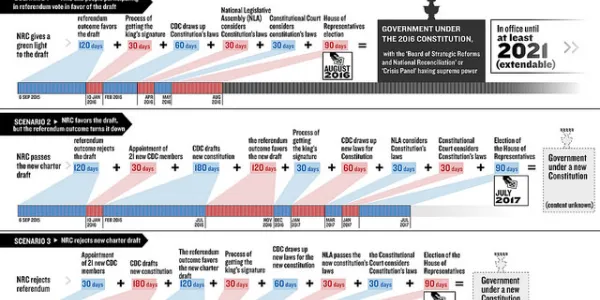By Kongpob Areerat and Thaweeporn Kummetha |
<p>More than ten years after the war on drugs wreaked havoc on many Lahu ethnic minority families in the hilly northern Thai-Myanmar border, arbitrary abuses and discrimination from Thai state authorities continue as they struggle to come to terms with their traumatic past.</p>
<p></p>
By Kongpob Areerat |
<p>Despite the euphoria surrounding the upcoming national election in November 2015, human rights abuses and violations are still prevalent in Myanmar with no clear sign of improvement.</p>
<p>Representatives from many local civil society organisations (CSOs) in Myanmar took the floor at a Lecture organized by UPR Info and the Burma-Myanmar UPR Forum, at Thammasat University, Tha Prachan Campus, Bangkok, on Wednesday morning, 9 September 2015, to present on the human rights situation in Myanmar and in the borders of Thailand/Myanmar. </p>
<p dir="ltr">The vote of the National Reform Council (NRC) for or against the draft constitution on 6 September 2015 is a pivotal point for Thai politics. At the end of the line, however, people will be given two main choices: whether to prolong the life of the Thai junta; or to have an elected government by late 2016, which will be lorded over by a ‘Crisis Panel’, a Thai style ‘Politburo’.</p>
<p></p>
By Kongpob Areerat |
<p>The latest in-depth investigation into the Thai public health system shows much higher figures for maternal deaths and infant mortality than previously documented, revealing inequality in public health services despite the universal healthcare system.</p>
<p>On Tuesday afternoon, 25 August 2015, the <a href="http://tdri.or.th/en/">Thailand Development Research Institute (TDRI)</a>, a Thai public policy think tank, held a press briefing on a report of Thailand’s public health policies.</p>
By Kongpob Areerat |
<p dir="ltr">With an increasing need for energy, the Royal Cambodian Government has spent nearly a billion US dollars on a hydroelectric dam that it claimed was necessary for industry. However, the real social and economic cost of the dam, which will flood an area equivalent to a small province and submerge thousands of families’ houses, might far exceed its construction cost as it might deprive millions of Cambodians of their most important food staple.</p>
<p></p>
By Kongpob Areerat |
<p>A Thai military court has sentenced a man accused of defaming the Thai monarchy on a social network to 30 years in jail in a trial held in camera. The ruling is the heaviest jail term ever recorded for a lèse majesté case.</p>
<p>On Friday morning, 7 August 2015, the Bangkok Military Court sentenced Pongsak S. to 60 years imprisonment for offences under Article 112 or the lèse majesté law and Article 14 of the Computer Crime Act (importing illegal content into a computer system).</p>
By Kongpob Areerat |
<p>More than two-thirds of the committee responsible for screening the candidates to Thailand’s National Human Rights Commission (NHRC) are high-ranking military officers.</p>
<p>A leaked classified document listing the members of the committee authorized to screen the behaviour and ethical backgrounds of the candidates to the NHRC shows that 12 of the 17 are four-star military offcers.</p>
<p>Four other members are civilians and the remaining member is a police general.</p>
By Kongpob Areerat |
<p>After the names of the candidates for the National Human Rights Commissions of Thailand (NHRC) were revealed, many eyebrows were raised over the nomination of an ultra-royalist with a record of human rights abuse. For many human rights defenders, however, it is only the symptom of a malady that has long rendered the rights commission impotent.</p>
<p></p>
<p>Following revelations by WikiLeaks that the Thai authorities allegedly purchased a surveillance programme from an Italian firm, further leaked documents show that staff from the IT firm went to Thailand’s Deep South to deliver certain products. </p>
<p>The Thai Consulate in Germany threatened to withdraw donations to a German university in Frankfurt for inviting an anti-junta lecturer to talk about Thai politics. </p>
<p>According to Pavin Chachavalpongpun, a fierce critic of the Thai junta who is a Thai Associate Professor at the Centre for Southeast Asian Studies, Kyoto University, Japan, the Thai Consulate in Frankfurt, Germany, on Tuesday, 14 July 2015, threatened to withdraw funding to the Goethe University of Frankfurt for inviting him to speak as a guest lecturer about Thai political development.</p>
By Kongpob Areerat |
<p>Thailand might be viewed as one of the most open-minded countries in Southeast Asia when it comes to LGBT. However, the country’s laws still put LGBT people at the margin. </p>
<p>On 14 July 2015, a network of academics and LGBT activists from the <a href="https://www.facebook.com/thaitga">Transgender Alliance-Thai (TGA)</a> organised a public seminar at Thammasat University, Tha Prachan Campus, called ‘Gender Recognition Advocacy for Transgender in Thailand (T-GART)’ in order to gather opinions about ways to push for legal recognition of LGBT people in the country.</p>
<p>A Thai police officer has accused a board member of <a href="https://www.amnesty.or.th/">Amnesty International Thailand</a> (AI Thailand) of sedition for showing support for the 14 embattled anti-junta activists. </p>
<p>Baramee Chairat, a recently re-elected member of the board of AI Thailand and a coordinator of the <a href="http://www.prachatai.org/english/category/assembly-of-the-poor">Assembly of the Poor (AOF)</a>, told Prachatai that on Monday, 6 July 2015, he received a summons from Samranrat Police Station in Bangkok.</p>

